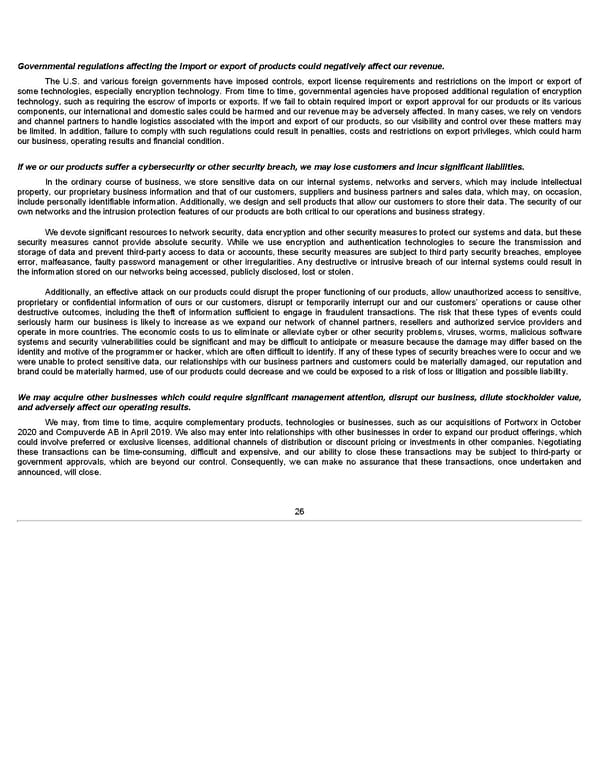Governmental regulations affecting the import or export of products could negatively affect our revenue. The U.S. and various foreign governments have imposed controls, export license requirements and restrictions on the import or export of some technologies, especially encryption technology. From time to time, governmental agencies have proposed additional regulation of encryption technology, such as requiring the escrow of imports or exports. If we fail to obtain required import or export approval for our products or its various components, our international and domestic sales could be harmed and our revenue may be adversely affected. In many cases, we rely on vendors and channel partners to handle logistics associated with the import and export of our products, so our visibility and control over these matters may be limited. In addition, failure to comply with such regulations could result in penalties, costs and restrictions on export privileges, which could harm our business, operating results and financial condition. If we or our products suffer a cybersecurity or other security breach, we may lose customers and incur significant liabilities. In the ordinary course of business, we store sensitive data on our internal systems, networks and servers, which may include intellectual property, our proprietary business information and that of our customers, suppliers and business partners and sales data, which may, on occasion, include personally identifiable information. Additionally, we design and sell products that allow our customers to store their data. The security of our own networks and the intrusion protection features of our products are both critical to our operations and business strategy. We devote significant resources to network security, data encryption and other security measures to protect our systems and data, but these security measures cannot provide absolute security. While we use encryption and authentication technologies to secure the transmission and storage of data and prevent third-party access to data or accounts, these security measures are subject to third party security breaches, employee error, malfeasance, faulty password management or other irregularities. Any destructive or intrusive breach of our internal systems could result in the information stored on our networks being accessed, publicly disclosed, lost or stolen. Additionally, an effective attack on our products could disrupt the proper functioning of our products, allow unauthorized access to sensitive, proprietary or confidential information of ours or our customers, disrupt or temporarily interrupt our and our customers’ operations or cause other destructive outcomes, including the theft of information sufficient to engage in fraudulent transactions. The risk that these types of events could seriously harm our business is likely to increase as we expand our network of channel partners, resellers and authorized service providers and operate in more countries. The economic costs to us to eliminate or alleviate cyber or other security problems, viruses, worms, malicious software systems and security vulnerabilities could be significant and may be difficult to anticipate or measure because the damage may differ based on the identity and motive of the programmer or hacker, which are often difficult to identify. If any of these types of security breaches were to occur and we were unable to protect sensitive data, our relationships with our business partners and customers could be materially damaged, our reputation and brand could be materially harmed, use of our products could decrease and we could be exposed to a risk of loss or litigation and possible liability. We may acquire other businesses which could require significant management attention, disrupt our business, dilute stockholder value, and adversely affect our operating results. We may, from time to time, acquire complementary products, technologies or businesses, such as our acquisitions of Portworx in October 2020 and Compuverde AB in April 2019. We also may enter into relationships with other businesses in order to expand our product offerings, which could involve preferred or exclusive licenses, additional channels of distribution or discount pricing or investments in other companies. Negotiating these transactions can be time-consuming, difficult and expensive, and our ability to close these transactions may be subject to third-party or government approvals, which are beyond our control. Consequently, we can make no assurance that these transactions, once undertaken and announced, will close. 26
 Annua lReport Page 25 Page 27
Annua lReport Page 25 Page 27